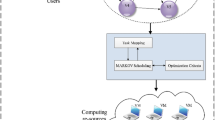Abstract
In our rapidly-growing big-data area, often the big sensory data from Internet of Things (IoT) cannot be sent directly to the far data-center in an efficient way because of the limitation in the network infrastructure. Fog computing, which has increasingly gained popularity for real-time applications, offers the utilization of local mini data-centers near the sensors to release the burden from the main data-center, and to exploit the full potential of cloud-based IoT. In this paper, a high-performance approach based on the Max–Min Ant System (MMAS), which is an efficient variation in the family of ant colony optimization algorithms, is proposed to tackle the static task-graph scheduling in homogeneous multiprocessor environments, the predominant technology used as mini-servers in fog computing. The main duty of the proposed approach is to properly manipulate the priority values of tasks so that the most optimal task-order can be achieved. Leveraging background knowledge of the problem, as heuristic values, has made the proposed approach very robust and efficient. Different random task-graphs with different shape parameters have been utilized to evaluate the proposed approach, and the results show its efficiency and superiority versus traditional counterparts from the performance perspective.








Similar content being viewed by others
Notes
Highest Level First with Estimated Time.
Insertion Scheduling Heuristic.
Which uses the cluster-like CLANs to partition the task graph.
Localized Allocation of Static Tasks
Earliest Time First.
Dynamic Level Scheduling.
Modified Critical Path.
References
Adam TL, Chandy KM, Dickson JR (1974) A comparison of list schedules for parallel processing systems. Commun ACM 17(12):685–690
Baxter J, PATEL J (1989) The LAST algorithm- A heuristic-based static task allocation algorithm. In: 1989 International Conference on Parallel Processing, University Park, PA
Botta A, De Donato W, Persico V, Pescapé A (2016) Integration of cloud computing and internet of things: a survey. Future Generation Computer Systems 56:684–700
Boveiri HR (2014) Assigning tasks to the processors for task-graph scheduling in parallel systems using learning and cellular learning automata. In Proc. 1st National Conf. on Computer Engineering and Information Technology, 2014, pp. 1–8 (in Farsi)
Boveiri HR (2015a) Multiprocessor task graph scheduling using a novel graph-like learning automata. Int J Grid Distribut Comput 8(1):41–54
Boveiri HR (2015b) List-Scheduling Techniques in Homogeneous Multiprocessor Environments: A Survey. Int J Softw Eng Appl 9(4):123–132
Boveiri HR (2015c) An efficient task priority measurement for list-scheduling in multiprocessor environments. Int J Softw Eng Appl 9(5):233–246
Boveiri HR (2015d) Task Assigning Techniques for List-Scheduling in Homogeneous Multiprocessor Environments: A Survey. Int J Softw Eng Appl 9(12):303–312
Boveiri HR (2016) A Novel ACO-Based Static Task Scheduling Approach for Multiprocessor Environments. Int J Computat Intell Syst 9(5):800–811
Boveiri HR (2017) An incremental ant colony optimization based approach to task assignment to processors for multiprocessor scheduling. Front Inform Technol Electron Eng 18(4):498–510
Boveiri HR (2018) 125 random task-graphs for multiprocessor task scheduling. Mendeley Data. https://doi.org/10.17632/4fycv9td56.2
Boveiri HR, Khayami R (2017) Static homogeneous multiprocessor task graph scheduling using ant colony optimization. KSII Trans Int Inform Syst (TIIS) 11(6):3046–3070
Cassales GW, Charão AS, Kirsch-Pinheiro M, Souveyet C, Steffenel LA (2016) Improving the performance of Apache Hadoop on pervasive environments through context-aware scheduling. J Ambient Intell Humaniz Comput 7(3):333–345
Chretienne P et al (1995) Scheduling Theory and Its Application. Wiley, New York
Dorigo M, Maniezzo V, Colorni A (1991) Positive feedback as a search strategy. Final report. Politecnico di Milano, Milan, pp. 91–016
Dorigo M, Caro GD, Gambardella LM (1999) Ant algorithms for discrete optimization. Artif Life 5(2):137–172
Guerrero C, Lera I, Juiz C (2018) A lightweight decentralized service placement policy for performance optimization in fog computing. J Ambient Intell Humaniz Comput. https://doi.org/10.1007/s12652-018-0914-0
Hu P, Dhelim S, Ning H, Qiu T (2017) Survey on fog computing: architecture, key technologies, applications and open issues. J Netw Comput Appl 98:27–42. https://doi.org/10.1016/j.jnca.2017.09.002
Hwang JJ, Chow YC, Anger FD, Lee CY (1989) Scheduling precedence graphs in systems with interprocessor communication times. SIAM J Comput 18(2):244–257
Hwang R, Gen M, Katayama H (2008) A comparison of multiprocessor task scheduling algorithms with communication costs. Comput Oper Res 35(3):976–993
Kruatrachue B, Lewis TG. Duplication Scheduling Heuristics (DSH): A New Precedence Task Scheduler for Parallel Processor Systems. Final report. Oregon State University, Corvallis; 1987. Report No.: OR 97331
McCreary C, Gill H (1989) Automatic determination of grain size for efficient parallel processing. Commun ACM 32(9):1073–1078
Sih GC, Lee EA (1993) A compile-time scheduling heuristic for interconnection-constrained heterogeneous processor architectures. IEEE Trans Parallel Distrib Syst 4(2):175–187
Stutzle T, Hoos H (1997) MAX-MIN ant system and local search for the traveling salesman problem. In: IEEE International Conference on Evolutionary Computation, 1997, pp. 309–314
Stützle T, Hoos H (1998) Improvements on the ant-system: Introducing the MAX-MIN ant system. In: Artificial Neural Nets and Genetic Algorithms. Springer, Vienna, 1998, pp. 245–249
Sze V, Chen YH, Yang TJ, Emer JS (2017) Efficient processing of deep neural networks: a tutorial and survey. Proc IEEE 105(12):2295–2329
Wang H, Wang Y (2018) Maximizing reliability and performance with reliability-driven task scheduling in heterogeneous distributed computing systems. J Ambient Intell Humaniz Comput. https://doi.org/10.1007/s12652-018-0926-9
Wu MY, Gajski DD (1990) Hypertool: a programming aid for message-passing systems. IEEE Trans Parallel Distrib Syst 1(3):330–343
Author information
Authors and Affiliations
Corresponding author
Additional information
Publisher’s Note
Springer Nature remains neutral with regard to jurisdictional claims in published maps and institutional affiliations.
Rights and permissions
About this article
Cite this article
Boveiri, H.R., Khayami, R., Elhoseny, M. et al. An efficient Swarm-Intelligence approach for task scheduling in cloud-based internet of things applications. J Ambient Intell Human Comput 10, 3469–3479 (2019). https://doi.org/10.1007/s12652-018-1071-1
Received:
Accepted:
Published:
Issue Date:
DOI: https://doi.org/10.1007/s12652-018-1071-1




